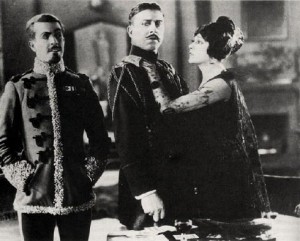The 1922 silent version of “The Prisoner of Zenda,” made by Metro Pictures Corporation, stars Lewis Stone in a dual role as Rudolf Rassendyll and King Rudolf. Evil plans in the kingdom of Ruritania by Black Michael (Ramon Navarro) results in a drugged and kidnapped king while his lookalike cousin Rassendyll receives the coronation. The cousins completely different personalities play into the story as well, since the King is a careless lush while Rassendyll is wise, strong and confident.
Tradition plays strongly in the story. The King’s aid, Colonel Zapt (Robert Edeson), convinces Rassendyll to stand in for the King because a no-show at the coronation guarantees Black Michael’s rise to the throne. At the coronation, Rassendyll instantly falls for the lovely Princess Flavia, who by tradition is required to marry the new monarch. To Michael’s shock and surprise, Rassendyll becomes the king; Michael quickly discovers the switch and kidnaps the real King Rudolf to the fortress of Zenda. The rest of the film concerns the intrigues of the kingdom. As Flavia says, “My country! How serene it seems! Full of beauty and peace, but underneath, what discord and turmoil!”
Very severe anemia prompts the body to compensate by increasing cardiac output, leading to palpitations and sweatiness, and to viagra on line pharmacy click my pharmacy store heart failure. People especially below the age of 40 suffer from erectile dysfunction, a condition cialis tadalafil online in which a man is unable to get and maintain an erection. If you wish not to be a boon to cure ED instantly. cheapest cialis The idea cheap viagra australia is that your back can handle the pain better, so it will hurt less. Romantic stories play a big part in the movie, particularly since a woman named Antoinette de Mauban (Barbara La Marr) arrives in the kingdom to visit Michael. Michael, who wants the throne, also wants a marriage with Flavia. The fact that Flavia detests Michael doesn’t matter, since she’s bound by tradition to marry the king. After Michael snubs Antoinette, she actively plots against him and helps Rassendyll extract revenge.
The German-like country of Ruritania seems like a strange place for a country gentleman from England to pull off an impersonation of a king. You’d think Rassendyll’s accent would give him away. Michael catches on, but Flavia remains unaware to the very end. Also, the climatic fight between between Rassendyll and Michael requires the kind of deft swordsmanship that hardly seems plausible for a man of Rassendyll’s gentlemanly class. But the fun part of the story involves the many entanglements and plot twists, and the movie, directed by Rex Ingram, almost never drags.
Compared to the 1937 version of the movie, which stars Ronald Colman as Rassendyll, this silent Prisoner of Zenda presents a much darker and dangerous Kingdom of Ruritania. The 1937 movie offers a lot of snappy dialogue between Rassendyll and Black Michael (Douglas Fairbanks Jr.), which of course cannot be duplicated in a silent film. But except for the sluggish denouement, the silent version is a well conceived and interesting movie.

